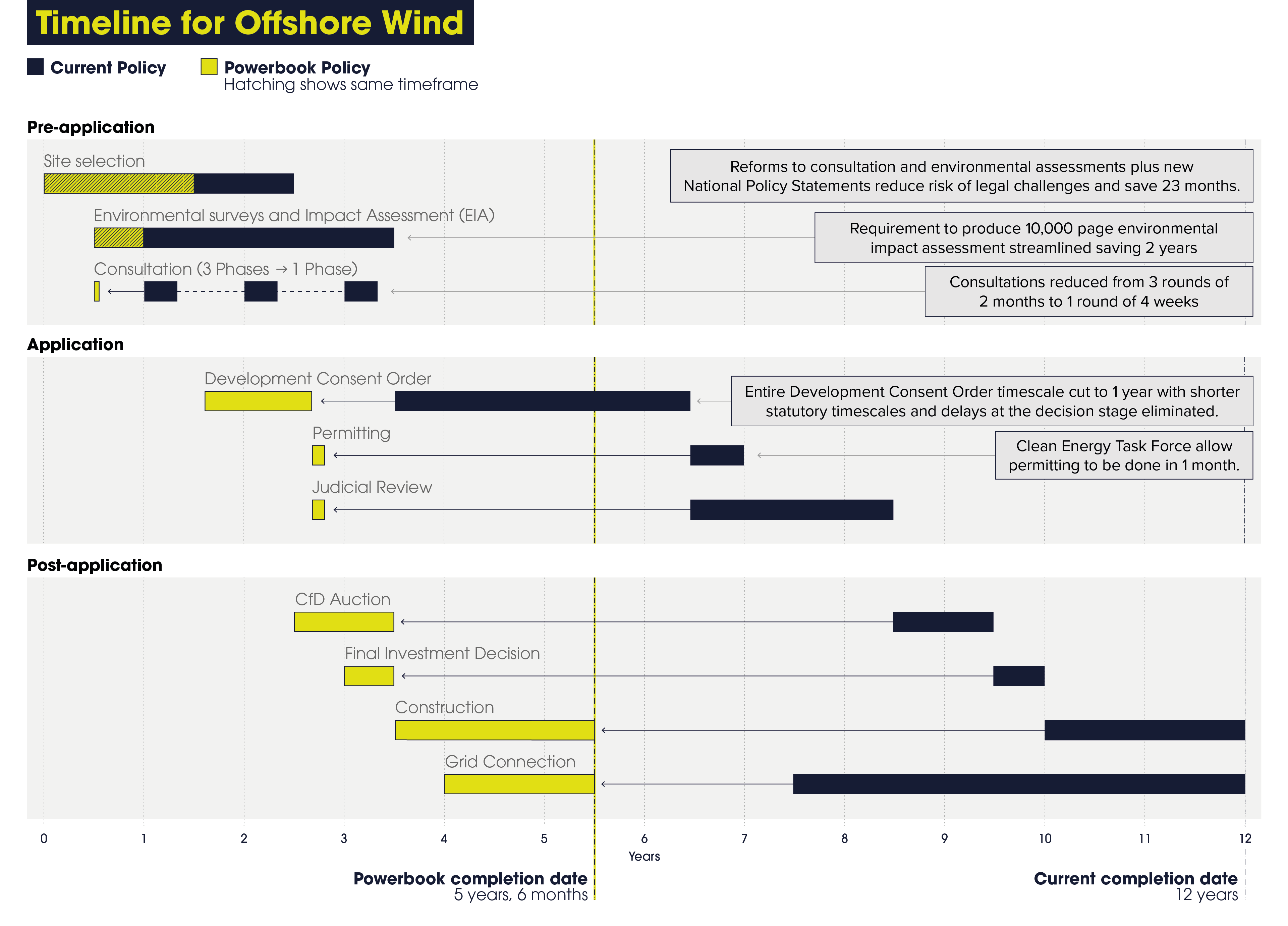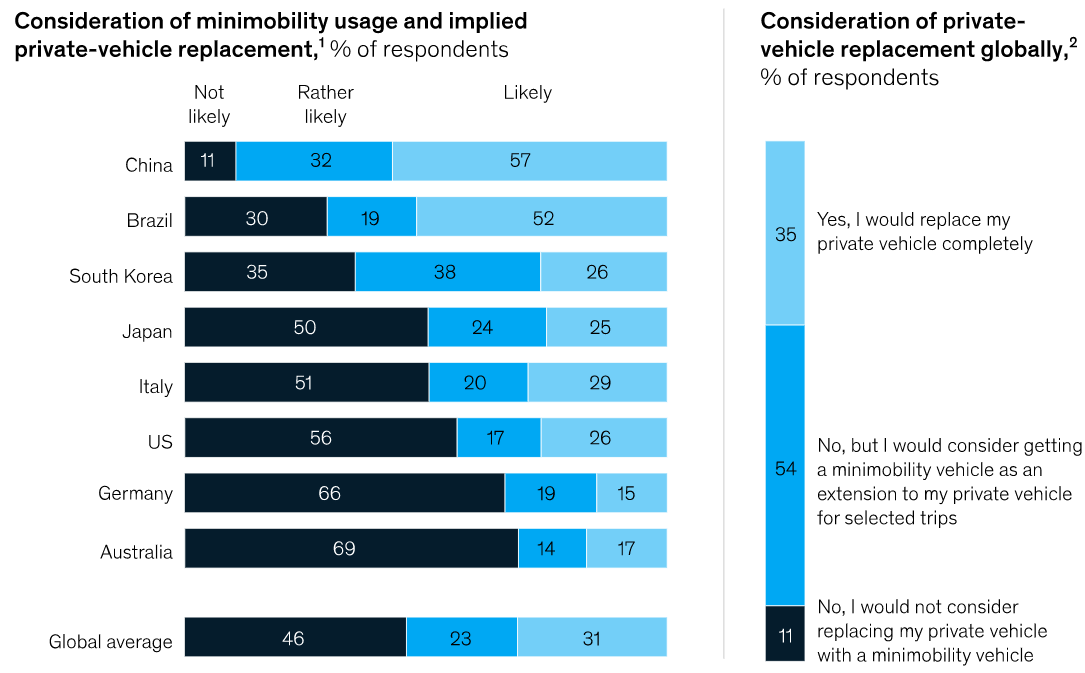Consumption Week 13
My notes from some of the media I consumed this week.
I decided to scrap the categories, as there is a lot of overlap. They’re still roughly ordered by category though.
Britain Remade’s Powerbook: A Playbook for Energy Security by 2030
https://www.britainremade.co.uk/powerbook
- The price of solar, onshore wind, and offshore wind have fallen by 62%, 55%, and 75% in under a decade. The main obstacles to generating more energy from wind and solar now are a broken planning system and archaic regulation for grid connections. It is not inevitable that it should take 12 years to build a new wind farm, 4 years to build a new solar farm, or 8 years to build a new transmission line to take energy to where it is most needed.
The road to autonomous driving is winding
https://www.mckinsey.com/featured-insights/themes/the-road-to-autonomous-driving-is-winding
- JG: A number of articles on the future of mobility covering areas including regulation, technologies (including autonomy and robo-vehicles), customers, profit models, barriers (charging, geopolitics, supply shortages, etc). I’m a big fan of minimobility (1~2 seaters):
What is a 15-minute city and why is the idea so controversial?
https://www.itv.com/news/2023-02-20/what-is-a-15-minute-city-and-why-is-the-idea-so-controversial
- JG: Great idea, but people are stupid, and some politicians are taking advantage of it.
- The idea is that everything a person needs should be within a 15-minute walk or cycle from any point in the city. This includes work, shopping, education, healthcare, leisure and any other amenities a person may need in their regular life.
- Several of the proposed policies for Oxford fuelled conspiracy theories that the government wanted to confine people to their neighbourhoods. Nick Fletcher MP: “These will take away your personal freedoms.” Mark Dolan: “A surveillance culture that would make Pyongyang envious.” Nigel Farage tweeted an article by the Daily Mail which described plans by Canterbury Council to stop cars travelling between neighbourhoods saying “the climate change lockdowns are coming.”
‘Human composting,’ already legal in 6 states, could help the planet: ‘Young people are going to teach us to die better’
- JG: It’s funny how the most obvious, natural idea is “new”. The only reason we’ve ever buried bodies in a preserved state (i.e. full of toxic chemicals) is religion. Once I’m dead just throw me in a hole. Or a burning ship burial.
Seaweed Is Having Its Moment in the Sun
https://www.nytimes.com/interactive/2023/03/15/climate/seaweed-plastic-climate-change.html
- In London, a start-up is making a plastic substitute out of seaweed. In Australia and Hawaii, others are racing to grow seaweed that, when fed to livestock, can cut methane from cow burps. Researchers are studying just how much carbon dioxide can be sequestered by seaweed farms, as investors eye them as a new source of carbon credits for polluters to offset their greenhouse gas emissions.
- In Korea, bordered by water on three sides, 20 different species of seaweed have been recorded. It is central to cuisine and culture.
- Since 1968, the waters where Mr. Shin farms have warmed by 1.4 degrees Celsius, slightly higher than the global average. That’s why South Korean scientists are racing to breed strains that can thrive in warmer waters.
All UK honey tested in EU fraud investigation fails authenticity test
https://www.theguardian.com/food/2023/mar/26/uk-honey-fails-authenticity-test
- Adulteration of honey with cheap sugar syrup has been exposed in a new investigation by the European Commission, which found 46% of sampled products were suspected to be fraudulent. Ten honey samples from the UK all failed the tests. They may have been blended or packaged in Britain, but the honey probably originated overseas.
Corporate Nonsense Continues To Harm Productivity And Corporate Culture
- Martin worked with a financial institution where, on average, employees received 800 emails every day. “If you do the math and you spend just one minute per email, that’s your entire workday, and you haven’t even done your work yet,” he explained.
- A month-long trial revealed that simply banning the CC button cut the total number of emails received by everyone in half.
- It could be removing the time-consuming but low-reward tasks like everyone’s favorite, “The meeting that was booked in order to prepare for the other meeting that will discuss what will happen in the real meeting.”
- The younger generations […] will never be engaged in their work if they continue to be stuck on the hamster wheel of responding to emails and getting dragged into meetings without any usefulness.
Stepping up: Becoming a high-potential CEO candidate
- Stanford University economics professor Nicholas Bloom, who’s spent his career researching CEOs, describes the reality he’s observed: “It’s frankly a horrible job. I wouldn’t want it. Being a CEO of a big company is a hundred-hour-a-week job. It consumes your life. It consumes your weekend. It’s super stressful. Sure, there’re enormous perks, but it’s also all encompassing.”
- Don’t miss a step on the dance floor—deliver on your day job.
- “Do the job you’re doing today like you’re going to do it for the rest of your life,”
- Climb onto a higher balcony to hone your view of the future, the company, and the company’s stakeholders.
- “You have to have an absolutely first-class view of where the world is going.”
- “I’ve seen too many candidates two years out make the mistake of moving to roles they don’t have time to succeed in,”
- They need to have their pulse on employee, customer, and board sentiments and use them to help shape their company’s principles as issues emerge.
- Be bold, whether on the balcony or the dance floor.
- Objectively assess your capabilities versus what’s needed.
- The first is your breadth of experience and record (for example, leading transformational change, delivering a profit-and-loss statement, and representing the company externally).
- Second is your knowledge and expertise (for example, financial acumen, sales leadership, technology, target markets, and industry trends).
- The third is your leadership skill (for example, strategic thinking, executive presence, team building, and self-awareness).
- Finally, how strong are your relationships, and what is your reputation? How are you viewed by internal stakeholders, such as your boss, peers, direct reports, and influencers? How about by external stakeholders, such as investors, customers, suppliers, regulators, and community leaders? And how about by board members?
- Fill your skill gaps and gauge your progress on the way.
- Refuse to play politics in the process.
- You’ll want to increase your visibility to ensure that those who need to know are aware that you want to make the final ascent without being seen as self-promoting or currying favor.
- You’ll be able to articulate why you want the role. You’ll have a bold vision for where the company should go next and how value will be created across the portfolio. You’ll also have translated that into a perspective on what the company needs from its next CEO and be able to make a fact-based argument that your experience, knowledge, leadership skills, and relationships make you the right horse for the course. You’ll be prepared to talk about how you’ve grown over the past three to five years yet also be clear-eyed and honest about your areas of weakness and how you’ll need to surround yourself with others who can help in those areas. You’ll also have built a following among your colleagues by leading authentically and helping others.
The age of average
https://www.alexmurrell.co.uk/articles/the-age-of-average
- JG: The basic premise of the article is “fashions and trends exist, and in the globalised world, they exist worldwide”. But the summary message is nice:
- This is your call to arms. Whether you’re in film or fashion, media or marketing, architecture, automotive or advertising, it doesn’t matter. Our visual culture is flatlining and the only cure is creativity. It’s time to cast aside conformity. It’s time to exorcise the expected. It’s time to decline the indistinguishable. Or as the ad agency BBH says: When the world zigs. Zag.
Essentialism - Greg McKeown (Blinkist)
- Only do the few essential things. Do less, but better. Have a single big goal.
- Give yourself time to be bored.
- Give yourself time to play, for creativity.
- Be minimalistic. Journal only essential events, not everything. Focus. Remove things that waste your time.
- Ignore sunk costs.
- Routines help.
[The James Altucher Show] Mastering the Magic of Language: Insights on Persuasion and Connection
- Explicitly use the word “you” for social (”it’s good for you”) but not help/support (comes across as blame/accusation)
- Identity: “be a helper” > “please help”
- Choice: “should” vs “could”
[Discovery] The Case of The Blind Man’s Eye
- JG: Turns out I’m hypophantastic. Not ideal.
[The High Performance Podcast] E185 - Keir Starmer: My learnings from life, loss and love
- JG: What’s more important, policies or a leader? According to ISideWith I’m more Tory than Labour, but Keir does come across like a decent bloke.
Edward Dando
https://en.wikipedia.org/wiki/Edward_Dando
- Edward Dando (c.1803 – 28 August 1832) was a thief who came to public notice in Britain because of his unusual habit of overeating at food stalls and inns, and then revealing that he had no money to pay. Although the fare he consumed was varied, he was particularly fond of oysters, once having eaten 25 dozen (300) of them with a loaf and a half of bread with butter.
100 Tips for a Better Life
https://www.lesswrong.com/posts/7hFeMWC6Y5eaSixbD/100-tips-for-a-better-life
- JG: Many are generic or obvious (or simply don’t apply to me), but some I like:
- You can improve your communication skills with practice much more effectively than you can improve your intelligence with practice. If you’re not that smart but can communicate ideas clearly, you have a great advantage over everybody who can’t communicate clearly.
- You do not live in a video game. There are no pop-up warnings if you’re about to do something foolish, or if you’ve been going in the wrong direction for too long. You have to create your own warnings.
- If you listen to successful people talk about their methods, remember that all the people who used the same methods and failed did not make videos about it.
- When dating, de-emphasizing your quirks will lead to 90% of people thinking you’re kind of alright. Emphasizing your quirks will lead to 10% of people thinking you’re fascinating and fun. Those are the people interested in dating you. Aim for them.
Quotes
Success is an asynchronous and asymmetric outcome. It’s asynchronous because input/effort and outcome do not follow a linear timeline. You might struggle for years, only to succeed in a last random act. And it’s asymmetric, meaning there is no linear connection between the effort you put in and the success you get out.
Gennaro Cuofano, FourWeekMBA
I do regret the passing of what I regard as one of the great luxuries of civilisation, and that is solitude. I think those snatched moments, the 20 minutes when you’re waiting at the luggage carousel, you used to have to do nothing but go into your thoughts. Now we all take out our phone, we’ve been deprived of the signal for a couple of hours on an airplane, and maybe we don’t have quite as rich an inner life. If you get in the habit of solitude - which is an entirely different thing, by the way, to loneliness - treat your mind as a garden that you can walk around in, and I think generally leads to more happiness.
Ian McKeown, BBC Global News Podcast 31/3/23


